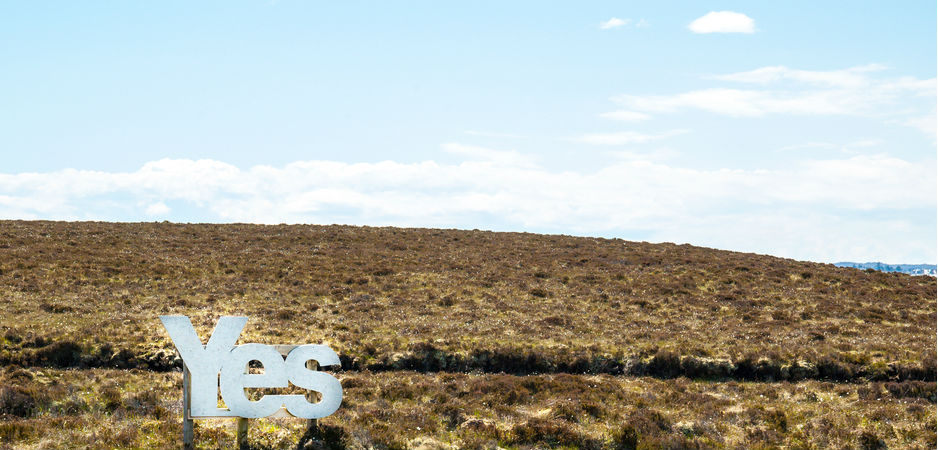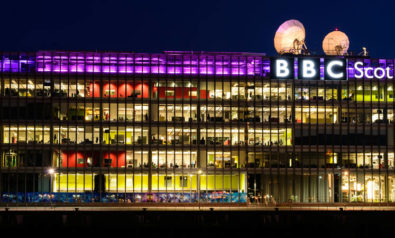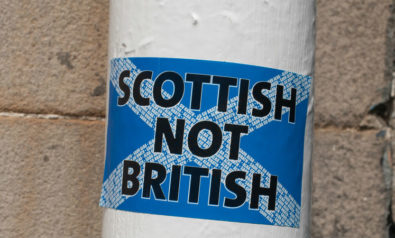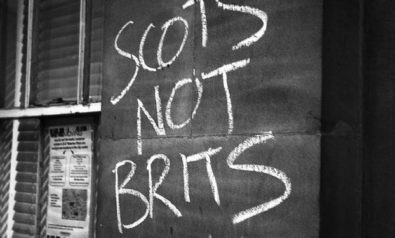Scottish independence is the first stage in a process to work toward a better society.
The way the debate on the pros and cons of the potential independence of Scotland has developed has been fascinating in a number of ways. The first is the considerable gap between the selectivity and the treatment in the mainstream press and media and the discussions, priorities and publications on the ground level. For people with access only to the press and the television news, it appears to be a debate between Alistair Darling, the figurehead of the Better Together campaign and Alex Salmond, the figurehead of the Yes campaign. With those icons, the language used is revealing: Yes supporters are commonly referred to as “nationalists,” No supporters as “unionists.” When the exchanges in the press, on social media and face-to-face have become more vituperative, Yes supporters have been lambasted as “cybernats,” as “the Hitler youth” and No supporters as “imperialists” or “Tories.” While, of course, all political campaigns have a minority of “characters” neither set of abuses is representative or accurate. It is the intention of this piece to broaden the perception, partly in order to give a more accurate account of the motivations of those working for independence and partly in order to provide a clearer appreciation of the case for independence.
It is necessary to open with a few notable absences. The first is the issue of “nationalist.” It is far from a synonym for “Yes voter,” which will be expanded upon below. But it is important to appreciate that the mainstream, predominantly Scottish National Party (SNP), Yes campaign should not be mistaken for any “ethnic” nationalism, raising comparisons with the Hungarian far right Jobbik party or Greece’s Golden Dawn. Where nationalism has been present it has been a more civic nationalism, inclusive and based upon a celebration of diversity and a responsibility to serve the interests of the “mongrel nation” that constitutes the citizenry of Scotland. This is facing much more into the future than the past, no fantasies of Braveheart or old grudges from the injustices of previous centuries. Alongside this goes the absence of Anglophobia, completely absent from the literature and rhetoric of the Yes campaign, a minimal murmur in online debates usually quickly denounced by most contributors.
The second absence is both revealing about the respective constitutions of the Yes and No camps and has proven to be important in the relative success of the former. That absence is an appetite to address much more than “merely” constitutional issues of sovereignty. It would be inaccurate to suggest that no No campaigners have any interest in social justice or in improving society; it would be accurate to suggest that that has never been a mainstay of their campaigning. In sharp contrast, as soon as the debates relating to the referendum started, many established activists in areas such as opposing austerity, nuclear weapons, against racism, for a less belligerent foreign policy, for LGBTQ rights, for gender equality, against the assault on the welfare state and Disability Living Allowance and often several of the above, were becoming involved in broadening the debate well beyond the choice between Westminster and Holyrood.
What We Mean by “Independence”
This broadening of the debate has proven critical in the growth of the Yes campaign. The first part is to question what we mean by “independence.” The referendum can move power from Westminster to Holyrood. But independence also needs to be addressed in terms of relations to NATO, as to whether Scotland should be a parking lot for nuclear weapons; in terms of independence from corporate influence either by lobbying or sly tax avoidance; in terms of relations with the EU; in terms of independence being measured by prioritizing the conditions of the poor and vulnerable over the interests of the wealthy and influential; in terms of the equity of land, both rural and urban, being owned and controlled by a tiny percentage of the population; and in terms of the best interests of the residents of Scotland being served by the protection of the environment rather than undue influence being given to the wishes of the energy industry.
This politicization of the formerly resigned and an interest in a fairer and better society has run along with a better informed and comprehending public than is represented in the media.
This shifted the demands and the intentions being fought for: The referendum was neither the sole issue nor the ultimate goal. It was now part of a process of independence to be continued in the changed circumstances of independence from Westminster. Parts of this agenda fitted alongside the mainstream Yes campaign but also took it in a more radical direction.
This radicalization has three elements of significance. The first is the variety of forums through which it grew. A list including the Radical Independence Campaign, the Common Weal linked with the Jimmy Reid Foundation, the National Collective linked to Yestival, the Aye Talks, Academics for Ayes, Yes LGBT, Women For Independence barely scratches the surface of the overlapping groups emerging. There has been a strong Green contribution, a CND presence and a broad left of center voice, but no party political allegiance involved.
The second is how this has contributed to a sustained activism and engagement of a breadth almost unprecedented. People well beyond the usual suspects bracket have seen an opportunity to have their voice heard running contrary to the broad disenchantment with politics and politicians that has grown in the past twenty years. People approach stalls to talk, to take leaflets, badges and stickers; people formerly uninterested in politics attend discussions and lectures on issues relating to economics, foreign policy, healthcare and immigration policies.
Some events match political opinion with music and poetry, fostering engaged and informed and predominantly civil discussions. On Sunday afternoon people of a variety of backgrounds took to Middle Meadow Walk in Edinburgh primarily to enjoy the energy and entertainment of the various Yes stalls, but there were some dogged No campaigners trying to win people over, and there was the pleasure of seeing a woman explaining the consequences of selling off council houses to a libertarian Conservative No campaigner, all done in a remarkably restrained and far from castigatory manner.
The third element is how this interest has been picked up more and more in recent weeks by the mainstream Yes campaign. When this campaign started there was a certain Green concern that it was too much of an SNP show and a tendency towards the lowest common denominator for a Yes. This stands in contrast to the cards being played now and much of the credit for this shift belongs to the individuals and groups knocking on doors, talking to people in the street, helping people who formerly would not have registered to vote to do so.
That is not to dismiss the work and the press events of the politicians on either side, merely to say that the plays of appeal have a different driving force that remains largely invisible to the mainstream media.
This politicization of the formerly resigned and an interest in a fairer and better society has run along with a better informed and comprehending public than is represented in the media. Many people appreciate that this is more than an opportunity to reject the Tories (although many find that attractive too). More importantly it is understood as a systemic change that is beneficial in three ways. The first, and most important, is that a Scottish Parliament with full budgetary control is a better bet for serving the interests of the people of Scotland.
This is enhanced by an awareness that the electoral system, a combination of constituency MSPs and “list” MSPs provide a broader political spectrum at Holyrood, more closely representative of the electorate than the first-past-the-post constituency MPs (with the addition of an unelected House of Lords) that constitutes Westminster. It reflects a desire for a system of governance where politicians are more accessible and more accountable – closer to home. This is far from seeing the referendum as a panacea or the MSPs as a band of angels. It is to see Scottish independence as the first stage in a process to work towards a better society.
The status quo ante as a promise of stability has proven poor as a persuasion, given the circumstances of a growth in absolute and relative poverty, the assault on the welfare state, the need for food banks, and 60% of austerity cuts still to come.
Thirdly, a dimension that has been important for many on the left concerned about abandoning the poor and vulnerable in the rest of the UK to the limited political register of the Tories, and the poor opposition provided by Labour. There is a notions that a vote for independence will give a useful kick up the system for Westminster, as it were, possibly leading to Labour politicians within the Westminster bubble to realize that there is an appetite for greater opposition within England, Wales and Northern Ireland, best shown through Left Unity and perhaps to force a reminder of old Labour values.
Not Nationalism, Currency or Oil
What has been the sharpest difference between the debate as conducted on the television and in the mainstream press has been the issues of concern. On the stalls, in the streets and in the local discussions, it has not been nationalism, currency or oil. It has been on social justice, the provision of social services, on Trident, on the NHS and on housing. There has been little sense of a Yes vote in the referendum solving everything, more a sense that this vote would be a means to make these goals more attainable and those on the left and within Labour share a commitment to working for the same goals post-referendum.
What has also been absent has been much impact of the efforts at fear and insecurity used by the Better Together campaign, ranging from the ridiculous threat from Ruth Davidson that we would not be able to watch BBC’s Dr. Who, through threats of exclusion from the EU – ironic intimidation given the promises of a referendum on that issue from Westminster, to the more draconian threats of depression from Deutsche Bank.
This is certainly not to suppose a Yes vote is assured, not least as many people have little faith in opinion polls. A successful campaign would be won against the force of most of the newspapers from The Times and Telegraph to the Express, the Mail and The Guardian, with The Scotsman and the Record on board too. A media scholar from the University of the West of Scotland examined the coverage on the BBC and found it considerable distance from objectivity. Many voters have come to trust the social media of Facebook and Twitter more than these orthodox sources, but that does not include the long committed No voters or, crucially, the undecided voters in the equation. The greatest certainty that can be attached to predictions is that, whichever direction they prefer, they are accompanied by a wing and a prayer.
Independence is seen as an opportunity and a responsibility, not as a panacea. The status quo ante as a promise of stability has proven poor as a persuasion, given the circumstances of a growth in absolute and relative poverty, the assault on the welfare state, the need for food banks, and 60% of austerity cuts still to come.
On the National Collective stalls, passers-by are given the opportunity to write their own motivation for voting Yes and the cards are then hung up for people to read. One written this afternoon captured the spirit of many. It read, “I wish for the chance to make our own mistakes.”
The views expressed in this article are the author’s own and do not necessarily reflect Fair Observer’s editorial policy.
Support Fair Observer
We rely on your support for our independence, diversity and quality.
For more than 10 years, Fair Observer has been free, fair and independent. No billionaire owns us, no advertisers control us. We are a reader-supported nonprofit. Unlike many other publications, we keep our content free for readers regardless of where they live or whether they can afford to pay. We have no paywalls and no ads.
In the post-truth era of fake news, echo chambers and filter bubbles, we publish a plurality of perspectives from around the world. Anyone can publish with us, but everyone goes through a rigorous editorial process. So, you get fact-checked, well-reasoned content instead of noise.
We publish 2,500+ voices from 90+ countries. We also conduct education and training programs
on subjects ranging from digital media and journalism to writing and critical thinking. This
doesn’t come cheap. Servers, editors, trainers and web developers cost
money.
Please consider supporting us on a regular basis as a recurring donor or a
sustaining member.
Will you support FO’s journalism?
We rely on your support for our independence, diversity and quality.













Comment